Here’s Why INFJs and INTJs Seem “Intense”
One of the things that repeatedly comes up in the personality community is the “INFJ stare” or the “INTJ death glare”, etc,. While I’m somewhat skeptical of these “stares”, I have to admit that INJ types are notoriously known for being intense. Why? Where does this intensity come from? How can it be spotted in real life? Let’s take a look!
Not sure what your personality type is? Take our new personality questionnaire here. Or you can take the official MBTI® here.
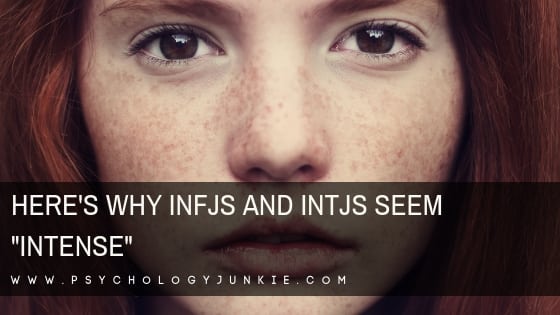
Here’s why INFJs and INTJs Seem “Intense”
INFJs and INTJs have a lot in common, at least according to their mental wiring. They both have a dominant mental process called Introverted Intuition, or “Ni” for short. They both have an inferior mental process called Extraverted Sensing, or “Se” for short. This means that they both tend to process information in a similar way, and they both tend to get stressed and annoyed by similar things. These processes work together to give INJs an intense, focused demeanor.
What is Introverted Intuition?
Introverted Intuition is a perceiving (information-gathering) function that focuses on interpreting abstract meanings, connections, and finding contextual information. It’s always asking, “What’s the deeper meaning here?”, “What isn’t being said/shown/revealed?”, “What is the one true meaning of this?”. INTJs and INFJs naturally reflect on complexities and the future implication of current events.
Why Does Intuition Make INFJs and INTJs Intense?
INJ personalities are often called the ultimate big-picture thinkers. They are always trying to figure out the core meaning of life, and the background purpose behind everything. They don’t like simple things, they like complex things. If a theory, idea, or possibility seems too simple they are frankly disappointed. They like perspectives and theories that they can sink themselves into and analyze from a hundred different perspectives.
INJs are the happiest when they have a sense of purpose and long-term direction. They are guided by a vision of the future, and if they don’t have that vision, they can be downright depressed. Their inferior function, extraverted Sensing (Se) also plays a role in their intensity. Because this is their least-preferred function, they tend to see Se-oriented activities as dull or shallow. It can be hard for them to live in the moment, react spontaneously to thrills and excitement, and just enjoy living for today. This is why many INJs would rather spend a night in with a book on philosophy than going to a party, or they’d rather watch an abstract, mind-bending film than something like “Fast and the Furious”. Sometimes this gives people the assumption that INJs are pompous or pretentious. Sometimes INJs CAN be that way. But many times, they don’t look down on people of other types, they just don’t “get” what makes all that other stuff so interesting!
In the mind of the INJ, experiences with less depth are often seen as interruptions to the meaning they are trying desperately to pursue. INTJs especially will shut down conversations that hold no deeper meaning or complexity. INFJs, who prioritize empathy, can appear interested in surface-level conversations, but this is usually a mask that hides their inner distraction and boredom.
So INFJs and INTJs Just Don’t Know How to Have Fun?
It’s not so much that they don’t enjoy having fun, but “fun” means something different to an INJ. It means reflecting on a philosophy, theory, or perspective. This can be done in a variety of ways – some INJs love math, psychology, art, or entrepreneurship. Whatever they do though, they want it to align with their core vision and purpose. Mature INFJs and INTJs balance this with occasional rest and relaxation periods – times where they can just have “fun” without thinking about it. They tend to do this in small bursts, though, because too much of it can make them restless and dissatisfied.
But what about that INJ “gaze” everyone talks about?
The “gaze” that so many people refer to is actually partially thanks to the power of Se. Se-users are known for having a piercing, focused gazes, especially Se-dominant types (ESTPs and ESFPs). They are completely tuned in to what is happening around them and can stare intensely into another person’s eyes without feeling the least bit uncomfortable. When INJs are alert to their surroundings or particularly invested in a conversation, they can exhibit the Se “lock in” gaze. INFJs are less likely to stare for a long period because their auxiliary feeling function makes them aware of how they appear to others and more conscious about the fact that they are staring and possibly making the other person uncomfortable.
INTJs, INFJs and “Intuitive Superiority”
Mature INJ personality types are aware that their preferences don’t make them “better” or superior to anyone else. They are aware not just of their strengths, but also their weaknesses. Unfortunately, less-mature INJs can feel that their preferences make them better, deeper, wiser, and more important than other personality types. They can turn their backs on other people (in fact, sometimes ALL other people) because they don’t want to “waste” their time on what they perceive as trivial concerns. They can get wrapped up in their own ever-shifting perspectives and visions and forget to interact with the world and the people in it. This can lead to Ni-Fi loops for the INTJ, or Ni-Ti loops for the INFJ. It’s also important to remember that just because INJs value intuition and like to use it, they can still use it incorrectly. If they get locked into an inaccurate perception and refuse to accept data from the world and people around them, they can have warped premonitions and theories. It’s important that both types work to develop their auxiliary functions, Extraverted Thinking for the INTJ and Extraverted Feeling for the INFJ to avoid becoming inaccurate in their perceptions.
What Are Your Thoughts?
Did you enjoy this article? Share your thoughts and ideas in the comments!
Find out more about your personality type in our eBooks, The INTJ – Understanding the Strategist, Discovering You: Unlocking the Power of Personality Type, The INFJ – Understanding the Mystic, and The INFP – Understanding the Dreamer. You can also connect with me via Facebook, Instagram, or Twitter!
Read These Articles to Find Out More:
10 Signs That You Might Be an Introverted Intuitive
3 Weird and Wonderful Secrets of the INFJ
Here’s the Science Behind Your Myers-Briggs® Personality Type
3 Weird and Wonderful Secrets About the INTJ
About Me:
My name is Susan Storm, and I’m an MBTI® practitioner and all-out psychology lover. I’ve been studying Jungian typology as well as developmental & childhood psychology for over ten years. Along with blogging about personality type, I love taking care of my 5 children and staying up late reading Kierkegaard. I’m an INFJ personality type. Follow me on Facebook, Twitter, or Pinterest to find out more about typology!



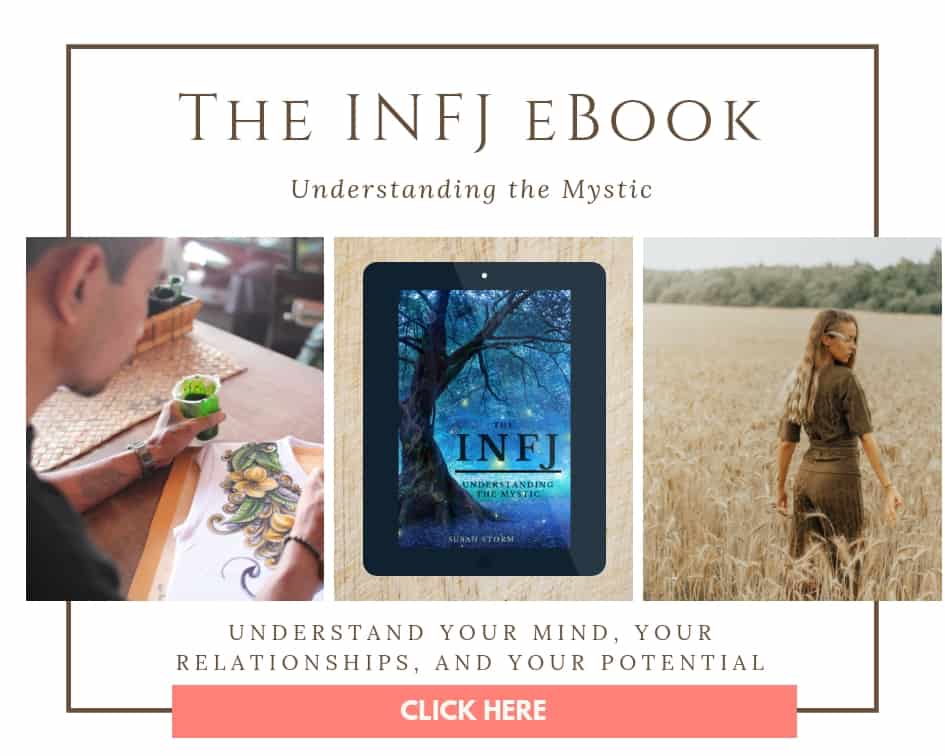


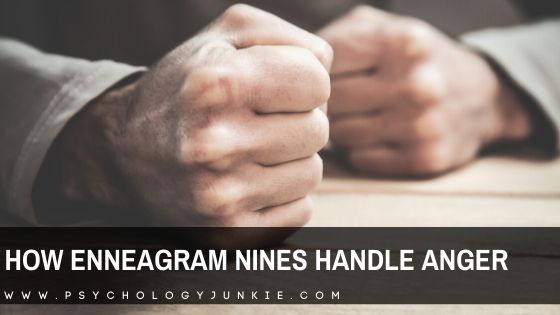

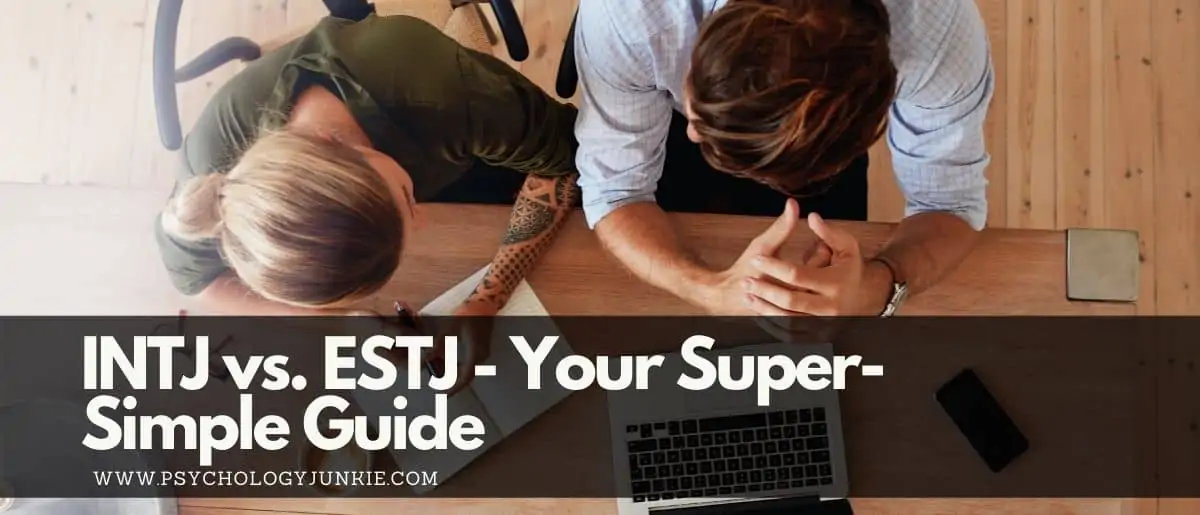


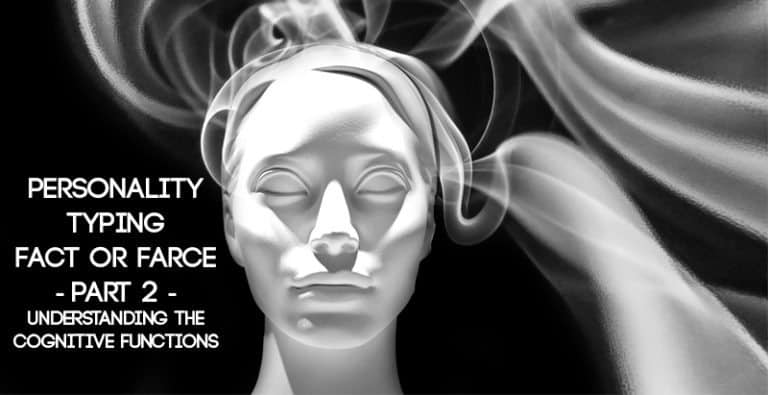
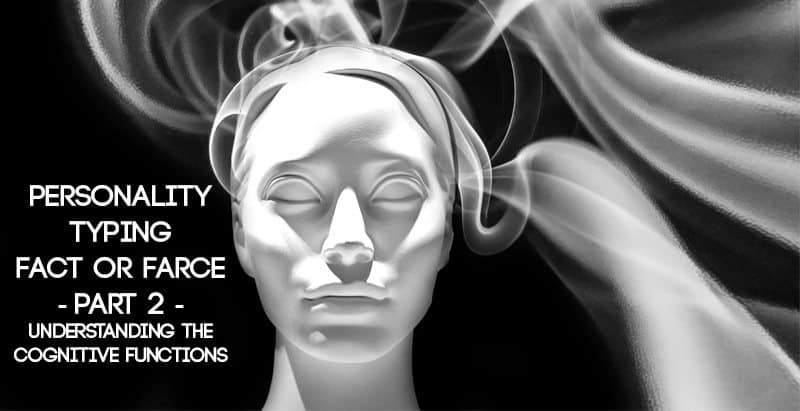




Would you make another post on why the INPs seem like “daydreamers” and “absent minded professors”?
(I think it is due to Ne and the Se PoLR function)
I will work on this, thanks for the suggestion!
Lovely and insightful post. As an INFJ, my default mode when in a serious conversation is this gaze lock in mode. At first, I thought it was part of my social akwardness but after awhile, I find it is preference of mine,so if I see someone getting uncomfortable, I will consciously alternate between looking away and at them or the wall behind them etc. Problem is to keep this natural when it is so natural to lock gaze.
This is all uncorroborated conjecture. Just an opinion piece and theory
Good article Susan. Lots of good points here. I esp. like how you refer to INJ’s, and leave out the other letter. So many of us see both T and F in us. I am sure in-depth testing will reveal one ohe other as dominant. However very helpful to see us referred to as 3 letters, not 4. Karen, female INJ something.
People always think I am mad about something when I am thinking .I frown because I am trying to figure something out in my mind’s eye.
Most of this is fairly accurate but I don’t feel you explored your topic enough. I finished reading still not knowin what makes us intense, in your opinion. I also think it is lazy to imply that INJs never enjoy parties, watching movies like “Fast and Furious,” etc. People are complicated and as an INFJ I have never felt boring but your characterization of us definitely gave that impression. I feel most fulfilled when discussing interesting topics and learning new things, but I also love going out with friends, watching comedy and action movies, and all sorts of other activities that you might consider “Se dominant” interests. I love Jungian theory but this article barely scratches the surface on INJ personalities, yet gives off the impression that it’s fully explaining things about us. I definitely feel misrepresented and I’m not sure I’d want to hang out with other INJs if they were all this unexciting to be around.
Thanks for your input! I definitely didn’t mean to imply that INJs never enjoy these things. In fact, that’s why I was careful to say “many” or “usually”. I hate absolute statements and refrain from using them because there are a lot of varieties of individuals within type. That’s also why I included a sentence about how they occasionally enjoy having fun without having to think about it, but perhaps I need to expound on that more to make it more clear so I’m glad you pointed this out. From what I’ve read, INJs enjoy occasional Se-activities, and it’s healthy for them to enjoy them sometimes, but they gravitate towards other things more often.
Susan,
As a 50-year old INTJ with an INFJ mother and INFJ best friend, I think you pretty much nailed it. We definitely prefer the complex over the simplistic. Definitely, have to fake interest in many simple, everyday conversations (talking about hair and makeup – just kill me now, please). And the Se does indeed come into play but I would like to add that there is an element of awe towards Se that you left out. For example, the three of us are enamoured with musicians/music (Mom was actually a singer for years and dated a drummer in a band and I grew up around live music and it was one of the best times of my life), home decor (I own a 1935 bungalow with fantastic historic features and a beautiful decor and have cultivated a garden full of wondrous sights and scents and sounds of the wind blowing in the leaves), beautiful things, the sublime gorgeousness of nature, etc., very Se things. I actually feel an ache for certain Se things. BUT that being said, I don’t usually sustain it for long periods of time before reverting back to dwelling on the meaning of life and planning my future (which takes the vast majority of my time since I’m building up my small business to sustain me financially once I retire. There is a certain romance when it comes to Se, as long as it’s at least tangentially related to something more complex, like cooking and baking (relates to biology and chemistry, health and wellness) music (relates to math and complex chords and harmonies), nature (smelling a rose, the fun of planning out a garden so you can grow your own food to sustain yourself, learning all about horticulture, applying sustainable, hugelkultur, permaculture and other practices), etc. It’s a beautiful mixture of meaning and Se. THAT is what grabs our full attention, at least for this INTJ. For INFJs I am sure it must be more related to the values and human side of things.
Im In the Point of ”warped premonition and theories” hits me hard.
I feel like you just explained my entire being much better than anything else. It all makes sense now
Thank you!! I’m so glad 🙂
I enjoyed all of this article, and I couldn’t help but laugh at the trueness of the part where it said that Infjs pretend to be engaged in conversations to hide boredom and save the feelings of the other person. I work in a healthcare office, and though I do care about the people and what is ailing them, I really don’t care to talk about much else. However I love that they love me and want to talk to me. It’s just the conversation isn’t usually enough to hold me.
One thing I still don’t get is why the INJs are considered more intense than other types that use Se, like ENFJs, ENTJs, ISTPs, and ISFPs? Is it because the INJs have that special combination of Ni which is intense on its own paired with the Se lock? There is definitely something different about our stares. I always noticed it from my Mom and my girlfriend and I know I do it as well. It’s just my hyperfocus due to my deep interest in whatever has caught my attention.
Yes, this is SO TRUE!!
“In the mind of the INJ, experiences with less depth are often seen as interruptions to the meaning they are trying desperately to pursue. INTJs especially will shut down conversations that hold no deeper meaning or complexity. INFJs, who prioritize empathy, can appear interested in surface-level conversations, but this is usually a mask that hides their inner distraction and boredom.”
I’m old enough now and was raised by an INFJ so learned not to shut down conversations because it’s rude but inside, that’s exactly what I want to do and I will look for my first opportunity to extricate myself politely.
One side note. I wish you would remove some of the ads on your site. I run a small web design business and your site has so many ads that it greatly impacts the performance of the site. I’ve been frustrated often when visiting this site and often tell myself I’m not going to subject myself to it again by coming back because, as I try to read the articles, things keep popping up in my way or moving abruptly up, down or out of sight. But I LOVE your content. Please hire a web designer to improve the performance of your site because I am sure you are probably losing visitors due to it which is a real shame since the content is so interesting!
Hi Holly, just add “ad block plus : free ad blocker” to your extensions.
Also keep in mind, the author of this site might be receiving revenue from such ads to help run and manage this site.
I love this site but there are way too many ads. I had three ads pop up while trying to watch the video clip that was only a minute and twenty seconds long and then just another while i was typing this.
Yikes! That is definitely way too many ads on a video! I’ve contacted the Ad Network that runs my ads to see if there’s anything to be done about that.
Question, I see on many blogs the “breakdown” of each type into the functions but no where have I seen a citation to where this breakdown is authoritatively authored. And the only information I’ve found that states the method of breaking down functions is on the Myers Briggs foundation website which clearly says that the functions are broken down by identifying first which is the dominate function (identified by the J/P with J = F/T and P = N/S and the E/I showing the outward/inward nature of the functions; all ordered by the idea of pairs). Which would mean the INFJ would be: Fi, Ne, Si, Te and the INTJ would be: Ti, Ne, Si, Fe.
Is this not correct? And why not? Where did the other version of the breakdown come from? If you can provide a citation that I could research, I would much appreciate it. Because otherwise, this blog article (among the many others on the internet) must be considered quite inaccurate.
Hi Dani! You can find out more about the function stacks if you have the official MBTI® Manual. J/P actually tells you that T or F is extroverted, not that it’s dominant. So if you’re an INTJ or INFJ it means your Thinking is extroverted (for INTJ) or your feeling is extroverted (for INFJ). But since we know you’re an introvert, we know Te or Fe must be your auxiliary function. I’ve got an article about the breakdown of the functions and how the type code can tell you which is which here: https://www.psychologyjunkie.com/2018/04/01/decoding-your-myers-briggs-personality-type/
But yes, if you take an MBTI practitioners course or read the official manual, they explain the breakdown there. You can also find information in “Building Blocks of Personality” by Leona Haas and Mark Hunziker, “Personality Hacker” by Joel Mark Witt and Antonia Dodge, and “Understanding Yourself and Others – An Introduction to the Personality Type Code” by Linda Berens and Dario Nardi. Hope that helps!
“how they appear to others and more conscious about the fact that they are staring and possibly making the other person COMFORTABLE.”
shouldn’t it be “uncomfortable”?
Just pointing out, no offense.
The article is definitely educating, btw.
(infj:)
Thank you for letting me know about that typo! It’s fixed now 🙂
I’m an infj and I don’t want to limit myself by reading these articles but they’re so interesting I keep coming back😂
Omg so true!
I feel the same way as an INFP 😂
I know that people are all individually unique and not to be put into boxes but these articles are so insightful I canät help but keep reading!
Good article, Susan, keep them coming! Just want to say that before I was aware of being an INTJ, and my husband an INFJ, I used to summarize to others about the two of us, that we are both intense people. Little did I know how accurate a quick, on the spot summary that was!
Once again it seems like you know every inch of me, I’m not used to that! I love all your work! I’m 47 and only became aware of personality types about 6 years ago, I had made a comment online and someone snapped back, I said don’t you know sarcasm? He asked if I was an INFJ, I asked him what he called me, I was thinking wow is that real bad! He gave me a link to take the test, 5 mins and it’s a yes! Well I kinda dove in after that, I also had one other person pick up on part of it, I do this not thinking because I don’t notice it, but when a conversation within a group is getting into a bad atmospheric type I tend to steer the conversation another way, he pointed it out and I realized yes I do do that and have been as long as I can remember, he said I had a great slyness to it, but he was studying this sort of thing. I wish I would have known about this as a true thing in my teens, I thought I was different and very rough childhood, I would have healed sooner I truly believe, thank you for your hard work and reading my short story here😁 I am in awe of you! 😘
That’s very relatable to me,like always. I don’t find it surprising anymore that your articles cover almost all the aspects of my personality type (INFJ). I have read your book on INFJ and got impressed to see the details you’ve mentioned about the INFJ personality. I would request you to write an article or make a video on how to improve and use inferior functions of an INFJ.
Last but not the least,your works help me a lot to know about myself and do the required improvements. Thanks a lot for this wonderful article